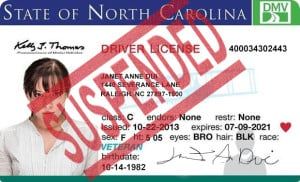A court case against you is tossed out. You’re free and clear, right?
Not so, at least if it’s a DWI offense. Even without a conviction, you can still lose your license.
The reason is something called “implied consent.” When you apply for a driver’s license in North Carolina — or any state in the U.S. — it is implied that you give your consent to certain measures in case you are suspected of impaired driving. These include blowing into a breathalyzer, doing a field sobriety test,  and possibly undergoing other chemical tests to determine if you have been drinking behind the wheel.
and possibly undergoing other chemical tests to determine if you have been drinking behind the wheel.
Recently in North Carolina, a Mount Airy woman was arrested and booked for DWI. She failed her field sobriety test and, according to police, showed visible signs of impairment.
However, the judge ruled that the police did not have probable cause for stopping her vehicle — it was not weaving or otherwise operating in a suspicious manner. So the case was thrown out.
 That’s when implied consent took over: the DMV still revoked her license for a year. As it turns out, the exclusionary rule —– the principle that evidence obtained illegally cannot be admitted in court — does not apply to license revocation.
That’s when implied consent took over: the DMV still revoked her license for a year. As it turns out, the exclusionary rule —– the principle that evidence obtained illegally cannot be admitted in court — does not apply to license revocation.
There were a couple of judicial flip-flops. The driver appealed, and a Superior Court judge reversed the DMV’s decision. But eventually the North Carolina Court of Appeals overturned the Superior Court’s decision. The revocation stands.
Every state has an implied consent rule, and Supreme Courts in a number of states have ruled that evidence from illegal searches can be used to support license suspension, even if it cannot be used in a trial.
Ultimately, what the ruling — and the principle of implied consent — come down to is that driving is a privilege. When you sign that document to receive your license, you’ve made a bargain with the DMV. The state has granted you the privilege to drive, and in turn, you will never drive impaired.
All told, a fair deal in North Carolina or any state.
